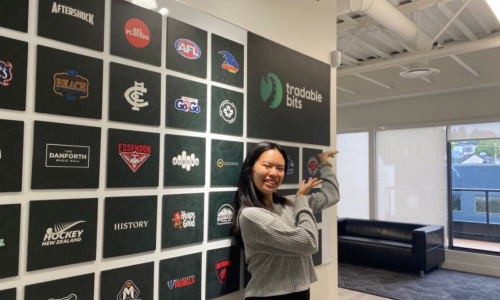
For my third co-op work term, I found myself celebrating Canada’s 150th birthday in British Columbia’s birthplace and bringing history to life at the Fort Langley National Historic Site as an interpretation assistant.
Fort Langley National Historic Site is a Parks Canada location nestled in the Fort Langley Township, just south of the Fraser River. Beginning in 1827, the fort was a Hudson’s Bay Company fur-trading post and played a vital role in the establishment of B.C. as a British colony. In fact, the proclamation of British Columbia as a British colony happened on the same site on November 19, 1858, and is the reason why the fort and the town around it is known as the birthplace of British Columbia. After its demise in 1886, because of a decreasing need for furs, the fort was established as a national historic site by Parks Canada in 1923. As a Parks Canada site, Fort Langley National Historic Site is dedicated to protecting and presenting its national significance while ensuring that the site can be enjoyed by present and future generations.
Today the site runs educational programs for students throughout the school year, and a separate programming schedule during the summer months. This schedule features a series of different demonstrations that happen throughout the day including an exhibition of historical weapons, blacksmithing, coopering, musket cleaning and a farm and garden talk. These programs are geared towards educating the public about the Fort’s four key messages: (1) Fort Langley was founded in 1827 to drive-off American fur traders, (2) the fort supplied other Hudson’s Bay forts with important goods and shipped salmon to Hawaii, (3) It became a trans-shipment depot for other HBC forts after 1848, and (4) It is the site of proclamation of B.C. as a British colony. During my work term at Fort Langley National Historic Site, I joined a team of enthusiastic interpreters tasked with educating and entertaining (a.k.a., “edutaining”) guests about the significance of the site in Canadian history. By constantly interacting with the public, I was able to improve my interpersonal, presentation and teamwork skills and my French-speaking abilities. s 150th birthday than a place so significant to Canadian history.
Interpersonal Skills
As an interpretation assistant, a large part of my job consists of speaking with guests and informing them about the four key messages, as well as answering any questions they may have. I found that this requires the ability to read the audience well. For instance, there are guests who want to learn everything and those who entered to simply take a stroll. In addition to this, there is a wide variety of guests who visit the fort ranging from families with young children to seniors. This means that interactions should be specifically tailored to the appropriate audience so that I do not communicate with adults like I do with children and vice versa. For example, while running the Xplorers program where children complete challenges around the fort, I talk using a very animated voice. However, when speaking with adults and seniors, I use a more serious tone.
Frequently engaging with guests means that I can improve my customer service skills by ensuring that all my guests’ needs are met. One way to achieve this is to ensure that everyone is having a good time. During specific times of the day, guests can buy tickets to participate in the BB Gun Musket Target Practice to try to hit the bull’s eye. Most of the time the participants are young children who have a very low chance of hitting the target at all. To mitigate this, I will often let them win by secretly poking a hole in the centre of the target. Nothing makes a six-year old girl who has never shot a gun before happier than getting a higher score than her older brother.
Presentation
Many of my duties involves giving a presentation to a large audience, whether it is to a group of students on site for a field trip or a group of guests watching a program. Whether I am addressing a small group of ten children or a group upwards of fifty people, I realize that I need to speak loudly and clearly, as well as engage the audience as much as possible by asking them questions or helping them relate my information to everyday life in 2017. Because there is a lot of information, it is also important to focus on a few main points so that the presentation is organized and the audience is not overloaded with irrelevant information.
Teamwork
Working closely with others means that I can further develop my teamwork skills by remaining adaptable and taking initiative. School programs require groups of students to complete different stations and challenges throughout the fort. With as many as eight groups running around, it can become hectic and certain stations may become backed up. When this happens, I help the interpreter in those stations (after confirming that there will be no groups in my station) to relieve traffic. Another situation where teamwork and adaptability is necessary is around noon, when there are less interpreters on site due to lunch. This requires collaborating and communicating with other co-workers so that important stations are covered. This may mean taking an earlier or later lunch break, moving to a different location, volunteering to do a co-worker’s task and being adaptable so that the site continues to run smoothly.
Learning French
As a federal government site, Fort Langley National Historic Site offers all of its programs in both of Canada’s official languages and I found myself being able to practice my French outside of the classroom. For example, I supported a French immersion school program by running le cours du saumon (salmon run) which illustrated how salmon would have been processed before it gets shipped from Fort Langley to Hawaii. Other than French immersion school programs, I practiced my French with Francophone visitors and at one point, gave directions in French to a confused child who could not find the correct building for the Xplorers program.
In addition to these important workplace skills, I also learned a few more interesting things including blacksmithing, making a barrel stave, taking care of farm animals, gardening, firing and cleaning a black powder musket, and using an 1800s-style bake oven. While these abilities may not be very useful in 2017, they are fun activities and give visitors a better insight as to what life would have been like in the 1800s.
Overall, this position has given me more confidence when giving presentations in front of a large audience and interacting with the public. Fort Langley National Historic Site is undoubtedly a place where history comes to life, and there is no better place to commemorate Canada’
Beyond the Blog
-
To learn more about opportunities like Alexis' visit the Arts and Social Science Co-op homepage.














